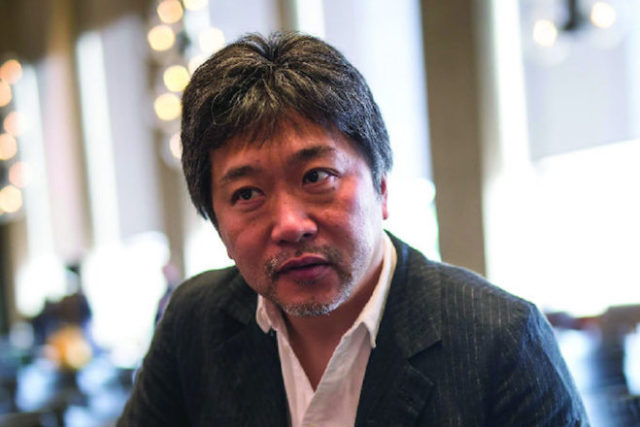By Yusuke Fukuda
Japanese director Hirokazu Koreeda, known for such films as Nobody Knows and Like Father, Like Son, held a workshop May 18 at the University of Washington’s Kane Hall. The workshop was hosted by the university’s Japan Studies program as part of Mitsubishi Corp.’s lecture series.
This was Koreeda’s first visit to Seattle. In an interview he did with North American Post ahead of the event, Koreeda shared his impression of Seattle as a “refined port city much like its sister city Kobe.”
“I’m not trying to be strategic,” said Koreeda, laughing. “I try to accept all invitations I get from film festivals and cities I have never visited before.” His statement reflects his desire to stay connected to new things. As for his directorial style, ever since he was drawn to the idea of “burying the poet within the masses,” Koreeda said he has been trying out a variety of approaches. Major American films such as Stand By Me and Kramer vs Kramer have served as one type of benchmark for their efficient storytelling technique. In Machikado Diary (Our Little Sister), Koreeda said he attempted to “tell the story in a way that salvages elements that fall through the cracks of a linear story.” Even as he gains in stature as a film director, Koreeda is constantly in search mode within his own films.
At the workshop, Davinder Bhowmik, assistant professor of contemporary Japanese literature at the university, asked Koreeda why he uses wind chimes and bicycle bells as frequently as he does. “I consciously incorporate things into my movies that connect viewers to sound, but with regards to wind chimes, I have been using them without much awareness, and it may be connected to some deeper psychology.” Then, to the string of pointed questions from Bhowmik, Koreeda said, “I feel as if I’m receiving psychological counseling,” drawing laughter from the crowd. When one of the students in the audience asked Koreeda why he doesn’t move the camera much, the director shows his writer side by replying that he believed there exists only “one right camera position to film one scene. The camera’s movements are limited by efforts to carry the story without ruining its structure.”
Koreeda said he plans to begin putting finishing touches on his next film, The Third Murder, after he returns to Japan. There is much anticipation over how the director will handle the genre of suspense. (The interview with Koreeda was arranged by collaboration with EN Pacific Service K.K.)







